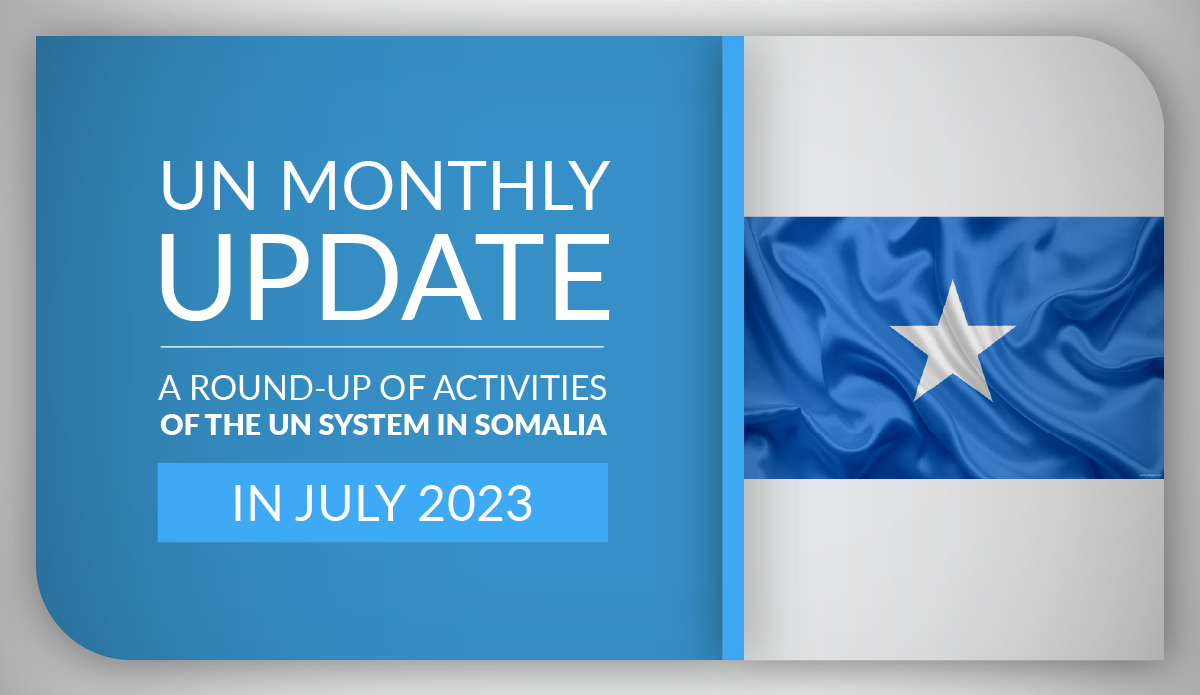A round-up of activities of the UN system in Somalia in July 2023
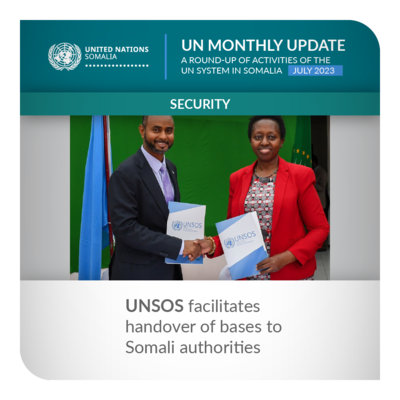 |
Security | UNSOS facilitates handover of bases to Somali authorities With the support of UNSOS, the African Union Transition Mission in Somalia (ATMIS) handed over six forward operating bases to the Federal Government of Somalia, formally capping the first phase of the ATMIS troop drawdown. “Today’s ceremony commemorates the successful handover of forward operating bases from ATMIS to the competent authorities in Somalia,” the Head of UNSOS, Aisa Kirabo Kacyira, said at a handover ceremony. “I salute the entire fraternity and leadership of ATMIS for the great strides and sacrifices they have made in Somalia, and I also commend the great effort and preparedness of the Government of Somalia and the Somali Security Forces for achieving this important milestone.” The handover was formalised by the signing of the land release agreement and certificate of gifted items following the conclusion of the first phase of the drawdown, which involves 2,000 peacekeepers. |
|
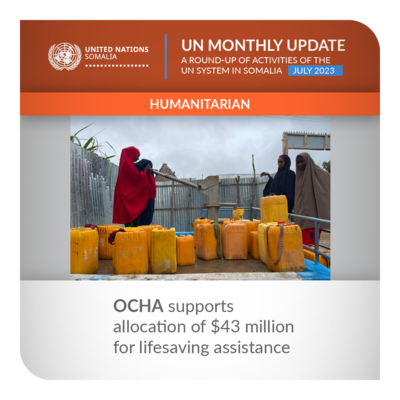 |
Humanitarian | OCHA supports allocation of $43 million for lifesaving assistance Managed by OCHA, the Somalia Humanitarian Fund (SHF) allocated $25 million for life-saving assistance to Somali communities affected by drought in 2023. Additionally, the Central Emergency Response Fund (CERF) – managed by the head of OCHA – provided $18 million as part of its global ‘famine prevention’ allocation. The two allocations of $43 million address the impact of drought and food insecurity in support of the 2023 Humanitarian Response Plan. The SHF is championing inimize ion, with 71 per cent of funding allocated directly to local organisations. The allocations also aim to strengthen the response in areas where the risk of famine persists and inimize further displacements by targeting hard-to-access rural locations in Bay, Lower and Middle Shabelle, which are major sources of displacement. The SHF is a mechanism created in 2010 to allocate funding for the most urgent life-saving interventions in Somalia. Combining flexibility and strategic focus, it allows for the timely allocation and disbursement of resources, enables effective humanitarian action, and strengthens coordination. The CERF provides seed funds to jump-start critical relief operations and fund life-saving programmes not covered by other donors. |
|
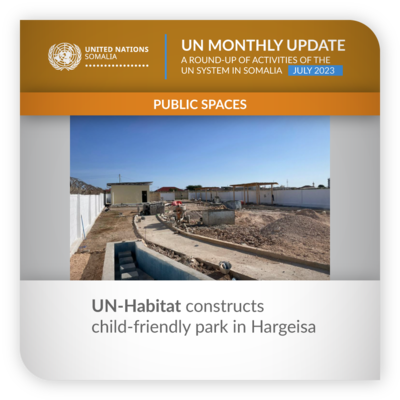 |
Development | UN-Habitat constructs child-friendly park in Hargeisa UN-Habitat made strides towards the completion of a child-friendly public park in Hargeisa, with the project aimed at providing room for the social, emotional, cognitive and physical development of children in Somaliland’s capital. Some 1,368 square metres in size, the park has been designed to cater to the needs of children. It will offer various amenities such as playgrounds, a pool, an educational space and a designated vendor's area, among other social facilities. According to UN-Habitat, the establishment of the park aligns with a resolution it adopted in 2011 on sustainable urban development through access to quality urban public spaces. |
|
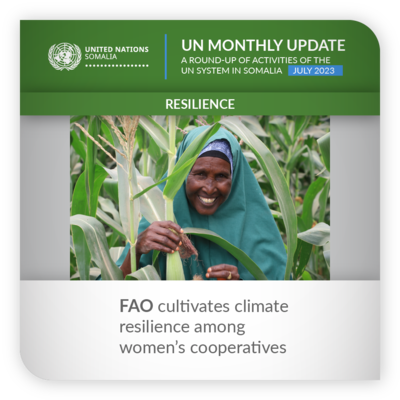 |
Resilience | FAO cultivates climate resilience among women’s cooperatives In partnership with UNIDO and ILO, FAO conducted a training programme for 40 female lead farmers from six cooperatives in the Marka district of Somalia. The training was part of FAO’s ongoing Productive Sectors Development Programme (PSDP), a project designed to help the private and public sectors in Somalia operate and sustain investments in productive sectors and related infrastructure. The training, funded by the UNDP-administered Somalia Multi Partner Trust Fund, aimed to equip these farmers with new knowledge and skills to increase productivity, enhance product quality, and promote sustainable agriculture practices. |
|
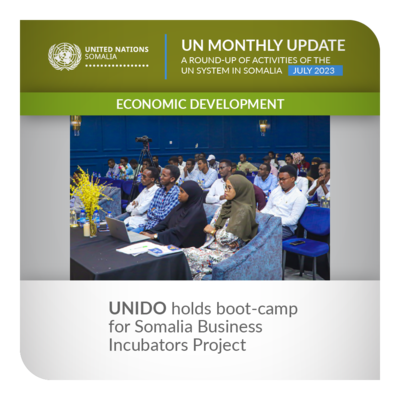 |
Development | UNIDO holds boot-camp for Somalia Business Incubators Project With the support of various partners, UNIDO held a three-day boot camp for the Somalia Business Incubators Project, with the aim of creating and improving economic opportunities and jobs for young Somalis through the delivery of locally available technology-based and innovation-led business incubation services. The boot camp was hosted in collaboration with Somali business incubators, including the iRise Innovation Hub (iRise), SIMAD Innovation Lab (SIMAD iLAB), both based in Mogadishu, and the Hargeisa Innovation Hub (HarHub), based in Hargeisa. The European Union-funded project received a total of 1,343 applications from aspiring entrepreneurs in Somalia, with the first winning cohort made up of 60 applicants hailing from Somalia’s agro-processing/agriculture sector, energy/environment sector, and creative industries. |
|
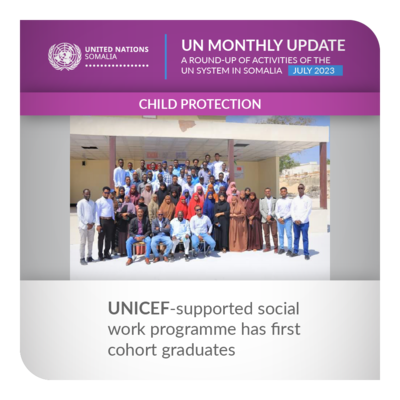 |
Child protection | UNICEF-supported social work programme has first cohort graduates The first cohort of 285 students graduated from a UNICEF-supported social work programme conducted through six universities. For the programme, UNICEF collaborated with international professors of social work, accredited universities and the Ministries of Women and Social Affairs in Puntland and Somaliland, as well as the Federal Government, to develop and deliver a world-class curriculum contextualised for the Somali context. The programme aims to strengthen the capacity of social workers, improve service delivery to vulnerable children and families, and advance the professionalism of the sector. The class of graduates was instrumental in providing an emergency response with psychosocial support and creating awareness during the COVID-19 pandemic in 2020–2021 and again after the devastating Waheen Market fire in Hargeisa in 2022. |
|
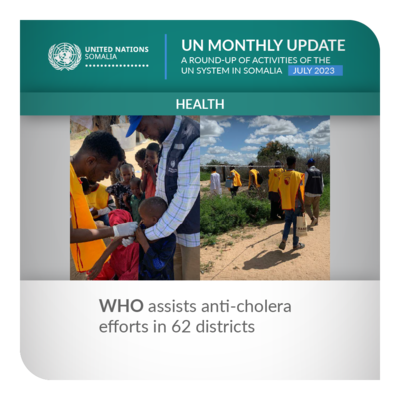 |
Health | WHO assists anti-cholera efforts in 62 districts WHO supported efforts to combat a cholera outbreak in drought-affected districts across Somalia. The UN health agency deployed 516 community health workers in 62 districts across six regions, including 31 drought-affected districts where WHO is implementing drought response activities. According to WHO, the cholera outbreak is attributed to a high proportion of internally displaced people with limited access to safe water and proper sanitation. It added that malnutrition is one of the major threats – some 6,191 children under the age of five years were screened for malnutrition, with 1,912 found to be suffering from moderate acute malnutrition and another 1,010 suffering from severe acute malnutrition. |
|
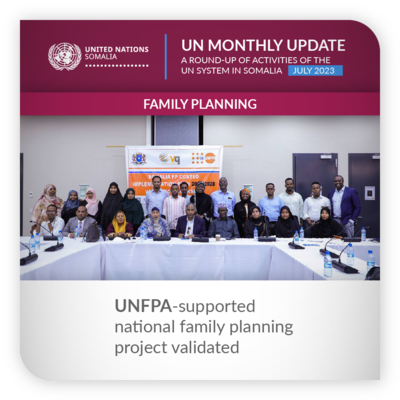 |
Family Planning | UNFPA-supported national family planning project validated At a workshop in Mogadishu, the Federal Ministry of Health and Human Services made history by validating the first ever UNFPA-supported National Family Planning/Birth Spacing Costed Implementation Plan (CIP) 2023–2028. The CIP is a detailed plan by Somalia to improve the health and well-being of its population by providing high-quality information and services related to family planning and birth spacing. According to UNFPA, it is envisioned that by 2028, the modern contraceptive rate will increase from the current 1 per cent to 4 per cent among married women of reproductive age. This CIP will be implemented at an estimated cost of about $8 million over a five-year period. UNFPA congratulated the Ministry and its partners for the attainment of this milestone and said it looked forward to collaborating further in the implementation and performance monitoring of the CIP. |
|
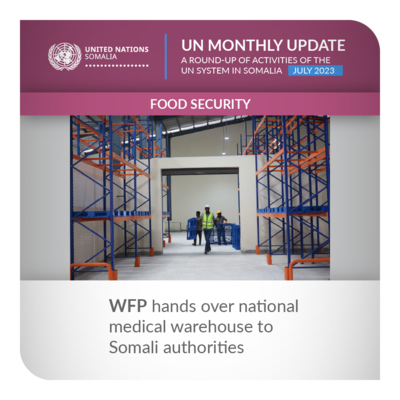 |
Food security | WFP hands over national medical warehouse to Somali authorities WFP handed over Somalia's new national medical warehouse in Mogadishu to the Ministry of Health and Human Services. Providing large-scale, temperature-sensitive storage for essential health supplies to be used all across Somalia, the warehouse will play a key role in strengthening the country's health supply chain. This is a key priority for the Ministry, supporting the delivery of an essential package of health services as it works towards the goal of universal health coverage. Selected by the Ministry as its partner of choice because of its expertise in logistics and warehousing, WFP not only built the facility but also provided extensive strengthening of systems and training for Ministry personnel. This will ensure the warehouse can play an active role in enabling the Federal Government of Somalia to deliver on its health commitments from the day of handover. |
|
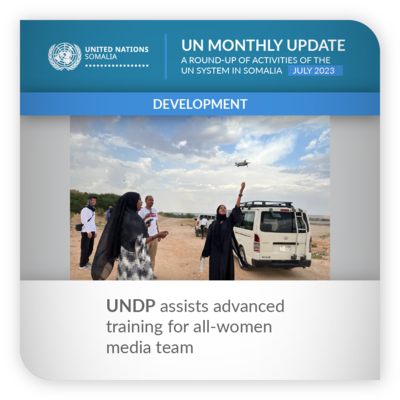 |
Development | UNDP provides advanced training for all-women media team UNDP provided training for Somalia’s ground-breaking all-women media team, Bilan, on advanced video editing, drone filming, writing for breaking news and the use and risks of AI for reporting. Along with UNDP staff, the training was provided by senior Somali journalists and an EU-based filmmaker. The media team’s new skills will help them raise the bar for reporting standards even higher than they have done over the last 18 months. Established with support from UNDP, Bilan has provided the first opportunity for Somali women journalists to decide what they want to report and how. They have used this freedom to break some of Somalia’s first major stories on challenging issues, including menstruation education (for Dalsan), mothers poisoning children for nutritional biscuits (Toronto Star), HIV-positive Somalis living in fear (El Pais), an epidemic of opiate use among women in Mogadishu (BBC) and how drought hits women and families (Guardian). |
|
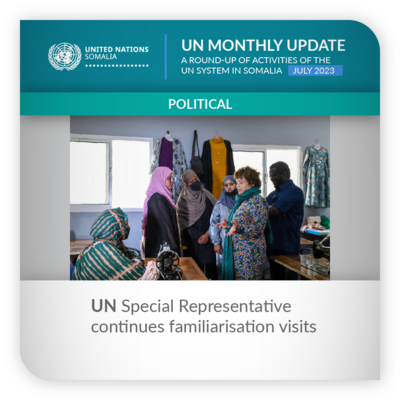 |
Political | UN Special Representative continues familiarisation visits The UN Special Representative for Somalia, Catriona Laing, continued her familiarisation visits across the country with stops in Galmudug and Somaliland. While in Dhusamareb, the capital of Galmudug, Ms. Laing met with the Federal Member State’s President Ahmed Abdi Karie ‘Qoorqoor' and discussed topics including state-building, security, local democracy and the establishment of a UN office. "We've had a really fruitful initial meeting and covered a lot of ground. We started discussing national issues and the various consultations that are going on regarding the National Consultative Council process," the UN Special Representative said during a press encounter there. "I commended the President for his commitment to a wide and inclusive consultation, including with civil society, with elders, with women, and with youth, because it is so important, as Somalia continues this state-building process, that the people of Somalia, opposition leaders, and others are brought into this genuine, inclusive dialogue.” While in Hargeisa, the capital of Somaliland, the UN official met with President Muse Bihi Abdi, as well as civil society representatives. “We talked about the future of the Somalia-Somaliland dialogue and the commitment the President gave to engage in those discussions constructively – so that was encouraging,” said Ms. Laing. |
|
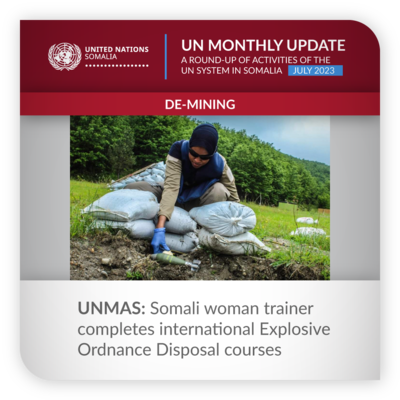 |
Demining | Somali woman trainer completes international Explosive Ordnance Disposal courses UNMAS was pleased to note that its Operations Specialist Trainer for the Somali Security Forces (SSF) project successfully completed the International Mine Action Standards (IMAS) Explosive Ordnance Disposal (EOD) Levels 1, 2 and 3 training courses – the trainer is the first Somali female staff member with UNMAS to obtain the IMAS EOD Level 3 qualification. The IMAS EOD Level 3 course increased the staffer’s knowledge and skills in Demolition Disposal Techniques, Guided Weapons, Land Service Ammunition Recognition and Explosive Ordnance Disposal Task Management, among other topics. “The most important capacity that I have strengthened during the training is the ability to support the delivery of EOD training to the SSF. I have received the international qualification, which will give me an opportunity to represent Somalia across the world and support the most affected countries in demining and disposing of the explosive ordnance. Moreover, I hope that my story will empower women, especially those who work in the security forces, and aspire them to pursue the profession of an EOD Operator,” the UNMAS staff member said after completing the courses. |
 UN
UN
